“Striving to make my dream a reality”
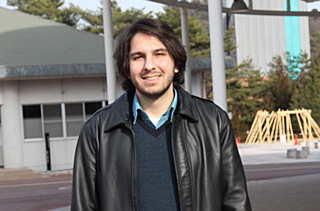
Name:Belal Ahmad
Nationality:Syrian
Major:Electrical Engineering
Affiliation:Graduate School of Engineering (Research Student)
Hobbies:Basketball,Reading
(Interview on March 7, 2013)
Thank you for doing this interview today. First off I’d like to ask, why did you choose to come to Japan for study abroad?
Coming to Japan for study abroad was a dream of mine for many years. I felt for a long time that particularly the way the people there live and interact, and how hard they work was really wonderful. Also, Japan’s work is top class in the world for what I want to do in my field with robots and electrical engineering too. So, because of that, I decided that after I graduated from university I would study in Japan.
Belal, you’re from Syria. When it comes to Japan, how is it viewed by the people of Syria?
In Syria the opinion of Japan is very high. Japan needed to rebuild from zero after their defeat in World War II, and now it has grown into one of the most developed countries in the world. It’s admirable that they were able to accomplish that with people’s hard work and a mutually respectful way of life. But we do think the custom of eating raw fish is a little questionable (laughs).
That’s right, Syria doesn’t have the custom of eating raw fish. By the way, did you learn Japanese at your university in Syria?
No. There was an office for the JSFA (Japan Syria Friendship Association) in my hometown of Homs. I learned Japanese language through there, and was able to meet people from JICA (Japan International Cooperation Agency). The more I learned about Japan the more I felt that I wanted to study abroad. It’s thanks to their support that I was able to come to Japan.
What did you study at your university in Syria?
Electrical Engineering. My major was Automatic Control.
Is the field of Electrical Engineering advanced in Syria?
No, in Syria the fields of Electrical Engineering and IT are still developing. But enthusiastic students will study books that they order from western universities. I read books from overseas and studied by myself too. Even if there aren’t good institutions of higher education nearby, if you have the motivation you can do that and improve yourself. For me, because I was interested in robots, I read many books about that and wanted to study in more depth in Japan since it has very advanced robotics technology.
Since Japanese people love robots.
Yes. A Japanese company developed a robot that moves just like a person. Using technology in friendly ways for humans with a sense of humor has a lot of meaning. Also, Japanese cartoons that have robots are popular in Syria, and I watched them when I was a little boy too. The Japanese lifestyle was depicted in cartoons, and from the appearance of things like Japanese houses and trains we came to know the Japanese lifestyle, and were really impressed by it.
When you first came to Hiroshima and Saijo, what sort of impression did you have?
I liked it a lot. Before I came to Japan I looked at Saijo on a map, so I knew that it was a small city. It’s different than big cities like Tokyo or Osaka. It’s a life that came from old Japan. It was good to be able to see the lifestyles of farmers. Compared to the city, people in the area have a really strong human bond with each other.
For example, my host family was like this too, but children will come back to their parents’ homes and help with the farm work. It’s lovely. In Syria too, often after the youngest child is married they will return to live in their parents’ house and help out. Since I’m also a youngest child, in the future I might do that too.
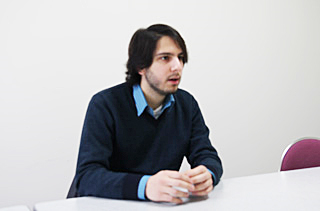
Belal, you’re a research student here. What have you learned at Hiroshima University?
Since my sensei is doing research on high-speed vision, I am able to study that in the research lab through experiments, though I’ve mostly been focused on studying subjects like math.
What have you learned from your everyday life here in Hiroshima?
Well, as for things I’ve learned from everyday life, I’d say that I’ve learned to act by myself. Since I used to only travel with my family, I never had the experience of traveling or shopping by myself. On top of that, in my country we don’ t use trains that often, so I had absolutely no idea which platform to go to or which train to ride, and I had to ask the people around me. When I first came it was very hard since I didn’t speak Japanese, but the Japanese people were very kind and helped me. They helped carry my luggage, and politely explained everything for me. In the meantime, I’ve developed to the point where I can do anything by myself.
That’s really wonderful. How is life in the dormitory?
It has a friendly atmosphere, and is very enjoyable. There’s space on the second floor of the dorm where everybody gathers, and students from different countries are able to gather there. We play games, talk about different topics and through that we’re able to get to know each other. If you live there you will never get bored. We mostly communicate in English, but there are some people there that you need to use Japanese with. That can be very hard, but everybody is very kind and we don’t have any problems. Everybody in the dorm tries to get to know one another and make a comfortable environment for each other. So in that sense, it is a warm family environment.
How is the Graduate School of Engineering? Have you been able to make many friends?
I’ve made friends in class and in the research lab. Fourth year student and Master’s course students are all busy with their studies and research. They don’t have much free time, but we went out together for New Years and had fun. Also, I have friends I met through playing badminton and basketball on campus. In Japan basketball isn’t as popular as baseball, but in Syria baseball isn’t as popular as soccer or basketball.
Syria is famous for being very good at soccer. Have you met many students from the Middle East at HU?
Yes, I’ve met two other students from Syria. From other Middle Eastern countries, our major is different, but I know students from Saudi Arabia and Egypt. But compared to other regions, there aren’t so many from the Middle East. Since Japan is really far from Syria, more go to Europe because it’s closer. It takes two or three hours to get to France or Germany, but to go to Japan it takes 12.
Do you cook by yourself?
Yes, Syrian food. But saying that, it’s hard to get the equipment like a griller you need for kebab. I make food using vegetables like broccoli, potatoes, onions, tomatoes, and meat, and then rice. Um… what’s that called in English, it’s not coming to me right now (laughs). Also, in Syria our staple food is a type of bread called “khubz”, not rice. Syrian bread is very thin; different than thick Japanese bread. Anyway, because my mother used to cook everything in Syria I had never cooked before. So when I first came here and cooked for myself I had many miserable failures, but recently I’ve been able to make food that I like. I don’t know if other people would like it though. (laughs)
So there’s that, and I also go shopping and do laundry by myself. For shopping I go to a nearby supermarket by bicycle. For laundry … actually at first, since of course I hadn’t experienced doing laundry in Syria, I really messed up and I did laundry without putting in any laundry detergent. I called my mother in a hurry and asked her “What should I do?” My mother explained everything to me from the beginning. So that’s how I learned little by little.

How does the climate in Hiroshima compare to Syria?
In the winter Saijo gets a little bit colder, but in the summer Syria is a little hotter. But the climates here and in Syria really aren’t very different. So I haven’t had many problems with differences in the weather. Since my hometown is far from the ocean, even in the summer the humidity isn’t all that high, but if you get near the ocean the humidity gets high and becomes uncomfortable.
In Syria isn’t there also desert?
Yes, there’s a very large desert. I think that in Syria it is fifty or sixty percent desert. In the middle of the Syrian Desert we have Palmyra, which is very famous and registered as a UNESCO World Heritage Site. It’s a very beautiful and historic city. It’s also famous for Queen Zenobia of Palmyra from the third century. If you ever have a chance to go to Syria, I recommend that place. Aside from that there are many other historical heritage sites. It’s a really wonderful country.
Can you also ride camels?
Of course. The camels people can ride aren’t wild. They’re camels that have been properly trained. When the trainer makes a signal the camel will get down, and that’s how you’re able to ride them. You can also ride a camel around the city and see the sites. You couldn’t say that riding a camel is comfortable, but it’s a lot of fun. Since camels can go for a long time without food or water they are good for traveling in the desert. I’ve ridden a camel twice, and aside from the comfort of the ride, it was a very fun experience.
I’ve heard that there are a lot of people who like sweets in the Middle East. Are there a lot of sweets shops in Syria too?
Yes, there are a lot of sweet shops. Syrian sweets are different than those in Japan, there are a lot of varieties and they’re very sweet. If you just have one or two you’ll get full. However, unfortunately these days most of the popular stores are closed. As you know, it’s because the war has expanded. Most of the areas in Syria are combat zones, and there are very few zones that are safe. It’s not a place where everybody can do normal business.
The serious situation of Syria is being broadcasted all over the world by television and other media. Could you tell us what sort of thoughts you have on Syria these days?
Now all of Syria is in a very hard situation. Most of the areas in Aleppo, Homs and Damascus are exposed to the threat of war. When I was in Syria too, there wasn’t a single day that I didn’t hear gunfire and bombshells. I have many sad feelings about it. Anyway, Syria used to be a very peaceful country. You could go places freely without paying attention to the time of day, and there were hardly any robbers. I used to be able to go to my friend’s house, and return home at 3 or 4 am without any problem. It was a normal thing for people who lived in the city to go out and walk in the middle of the night. Yet now people can’t go out after 6pm, and have to stay shut in their homes. I feel very very badly about that.
For two years when the crisis first started it was like demonstrations. There were no weapons, there were always just the security forces, sometimes shooting directly at demonstrators. But the situation deteriorated badly. As the situation got worse, people started to carry weapons to defend themselves. To me, I don’t think that is a good choice. The army has weapons like long-range missiles and airplanes, but people have rifles at best.
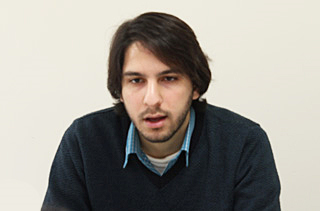
What is your hope for Syria now?
I am hoping for the war to end quickly. I lost my best friend in Syria. It happened one year ago. He was fluent in French and English, and he was involved with the press as a photographer. I think that in order to have mutual understanding, people need to talk with each other. That is the best way to end bloodshed. Having bloodshed means that you don’t know when you might lose one of your dearest friends or family. I really hope that the war is stopped now.
What do you think about Japan? Do you think it is a peaceful country?
Yes, it’s a very peaceful country. Particularly the attitude of the Japanese after the war was very peaceful. After the atomic bombings of Hiroshima and Nagasaki during the war, Japan tried to build a peaceful relationship without the use of violence, and seek friendship and understanding with America.
I heard that in America there are still many people who believe that it was a combat zone that was attacked; not peaceful civilian. When you talk to those people, and they learn that many of the victims of the atomic bombs were civilians they can be very surprised. I think that this is a good way to communicate what actually happened in your own country, and get to understand each other. People should meet with each other so they understand.
Indeed! By the way, what do you want to do in the future, after you’re done studying robots in Japan?
It’s really hard, but I want to become a professor. I want to work for three or four years in Japan as an associate professor and then go back to my country where I can work in universities to improve the education system. The education system in Syria now isn’t very good right now, so I want to improve that. I have a number of friends who want to do the same type of job. I really hope we accomplish that.
Can you tell us about the education system in Syria?
Yes. The 6 years of elementary school are compulsory. After that it’s possible to quit, but you can also continue on to middle school and high school. In Syria education is free from elementary school through university. You couldn’t say it’s a good education, but you don’t have to pay. I think because in Syria the middleclass income is about 40,000 Syrian Pounds per month, so no more than about $1,000 in US dollars. Compared to Japan and other countries it’s not very much at all, but that is how we manage.
Do you think that Electrical Engineering can help realize peace?
Of course. From the beginning I’ve thought that technology must be used in a peaceful way. Many countries and governments use technology for developing weapons. However, I feel that we don’t need weapons. If problems happen, we need to talk with each other and find resolutions. You don’t need weapons for talking. We need to use the technology that we have to make people’s lives easier. For example, now through computers and cell phones we can connect to anybody that we want. I can talk to my family in Syria for free via Skype. So I think that technology is really awesome if you use it in that way. I think that is being practiced in Japan.
I see! By the way, I heard that you had a lot of difficulty coming to Japan.
Yes. In Homs there is no airport so you need to go to Damascus first. The road going from Homs to Damascus wasn’t safe, so I followed a safer route to Istanbul, and then from there to Japan. It was very difficult, but I never felt like giving up because study abroad was my dream, and I had to strive to make my dream a reality.
So you came to Japan by yourself. I admire your courage. Belal, could you give a word of advice for other international students who want to come to Japan?
By all means, I recommend that they come to Japan. Don’t just come to learn about your major; learn about the wonderful Japanese culture. Japanese people are kind, and they don’t look at people with bias for race or religion. It’s a very lovely country. So I think, by all means, I want you to come and study in Japan.
Next, can you give a message to Japanese students?
Because the level of Japanese universities is high, there may be some students who don't want to go abroad. However, by going abroad you can expand your vision and get to know people overseas, while at the same time, you have the opportunity of teaching people overseas about Japan. By having Japanese students fly abroad Japanese culture can spread throughout the world. In my case too, thanks to meeting Japanese people in JICA I started to like Japan and am here now.
Thank you very much. One last question. Belal, in the future what sort of robots do you want to make?
I would like to make robots for medical applications. Not just for surgical procedures, but to make the lives of people who have physical disabilities easier. For example, people who have difficulty using their arms can live comfortably by using an artificial arm. It allows people to be able to do something they couldn’t before, and lets them be happy. It’s very awesome. So what I want to do is that type of job.
That’s really wonderful!
Thank you. Someday I want everybody in Japan to come visit Syria. My home in Homs and other places. I want the world to see what a wonderful country Syria is. I hope that the day when that can happen comes soon.
I think everybody wishes that. Belal, thank you so much for valuable time today.
Thank you very much.
Photo Gallery
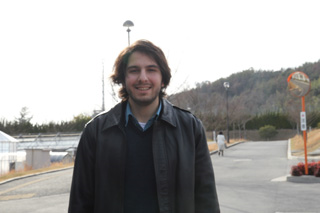
After the interview
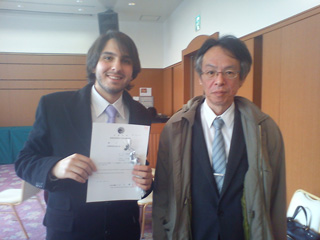
With Assoc. Prof. Fukami at the ending ceremony of Intensive Japanese Training Course


 Home
Home